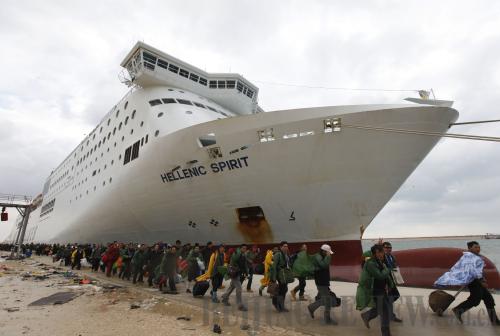Out of Libya
China completes a historic evacuation of 35,860 Chinese citizens from Libya within days
 |
|
READY TO LEAVE: Chinese evacuees wait in line to board a chartered vessel on February 25 in Benghazi, a port city in northeast Libya [Yu Yang] |
February 18 was a bad day for 37-year-old Deng Chaoyong. That night, a group of Libyan looters raided the Chinese hydropower giant Sinohydro Corp.'s building site in Benghazi, a port city in northeast Libya, where Deng had been working for the past six months.
"Our manager told us to stay calm and let them take whatever they wanted as long as they didn't hurt us. But after looting everything possible, they drove our cars toward us and shot at us," said Deng a week later in a hotel on the island of Crete, in south Greece.
He was shot in both legs and one shoulder during the raid. After being carried to a hospital in Benghazi on self-made stretchers, Deng and his injured colleagues found no doctor there.
"We stayed there for three days and barely got treatment," Deng recalled. "Then the situation became even worse. I thought I would die there."
Fortunately, Deng and other Chinese citizens in Libya were taken to Crete on chartered vessels on February 24. "Thanks to our government, we are safe now," he told Xinhua News Agency. One day later, Deng arrived in Beijing and got treatment.
Deng was one of more than 30,000 Chinese citizens trapped in riot-torn Libya. Within just a few days, China conducted its biggest evacuation ever to get them home from the North African country.
Danger
Libya is the world's eighth largest oil producer. Before riots broke out, many foreign employees, including those from Asia, worked in the country. Reports said there were about 60,000 Bangladeshi, 10,000 Vietnamese, 30,000 Filipinos, 23,000 Thais and 20,000 Indians.
Statistics from China's Ministry of Commerce (MOFCOM) show there were around 36,000 Chinese in Libya before the riots. Most of them were employees of Chinese enterprises that had contracts in the country. Altogether, 75 Chinese enterprises had 50 projects there, with a total value of more than $20 billion. Most projects were labor-intensive, in fields such as construction, railways, oil exploration and telecommunications.
 |
|
GETTING ABOARD: Chinese evacuees prepare to board the Hellenic Spirit in Benghazi, Libya, on February 25 [CFP] |
After the situation in Libya deteriorated on February 16 with the start of widespread riots, many Chinese enterprises were raided and robbed. MOFCOM said on February 24 that 27 Chinese building and residential sites were attacked, with 15 Chinese employees seriously injured. Looters robbed Chinese workers of their cars, computers, cellphones, cash, construction machinery and office facilities, and set fires. Losses exceeded $1.5 billion, said MOFCOM.
Given the volatile situation in Libya, China knew it was a must to withdraw its citizens as quickly as possible.
Chinese President Hu Jintao and Premier Wen Jiabao issued an order on February 22, requiring all departments involved to try their best to guarantee the safety of Chinese nationals in Libya. The State Council, China's cabinet, set up an emergency headquarters headed by Vice Premier Zhang Dejiang to coordinate and organize the evacuation operation.
Withdrawal
As of March 2, a total of 35,860 Chinese citizens had been evacuated from Libya. This meant all Chinese who desired to go home and whose whereabouts were known by the Foreign Ministry had been evacuated, said Vice Foreign Minister Song Tao.
It was the largest and most complicated overseas evacuation ever conducted by the Chinese Government since the People's Republic of China was founded in 1949, he said.
An Huihou, a research fellow with the Chinese Institute of International Studies (CIIS), said, unlike previous evacuations, this evacuation involved tens of thousands of people. Therefore, it was impossible to finish the job by sending planes alone. Riots in Libya also created trouble for the evacuation. Organizing so many people was another big task—most of them needed to be transported to China via third countries.
 0
0 







Go to Forum >>0 Comments